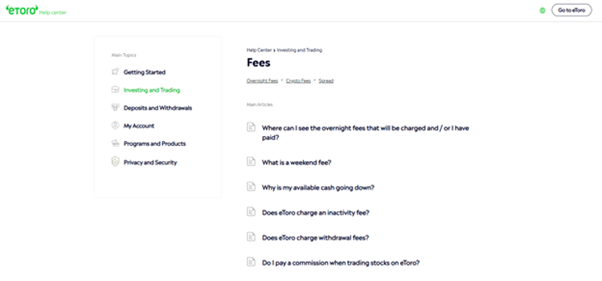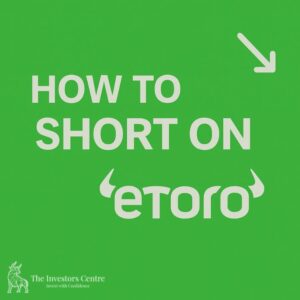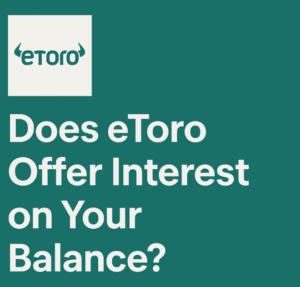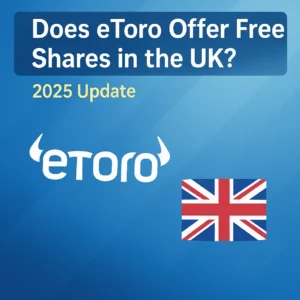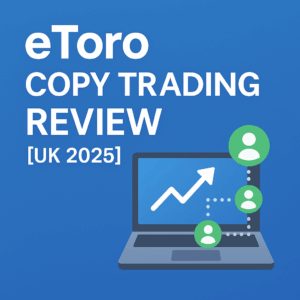eToro Fees Explained (2025): Trading Costs, Spreads, & Hidden Charges
Profile

Co-Founder
Thomas brings extensive experience in financial analysis and investment research. With a strong background in both institutional and retail investment sectors, Thomas ensures all content meets the highest standards of accuracy and relevance.
Follow on Twitter Connect on LinkedIn"Every piece of investment advice should be grounded in solid research and practical application. My role is to ensure our content provides real value to investors at every level."
My Favourite Writes:
Profile

Co-Founder
Dom is an experienced retail investor, learning his craft in what he likes to call the "hard way". Through many of these lessons he has crafted himself a sound investment strategy that has enabled him to make investing into a business not just a hobby.
Follow on Twitter"Financial clarity and integrity are the cornerstones of everything we do. We're here to ensure that your investment journey is built on a solid financial understanding and a sound strategic foundation."
My Favourite Writes:
Profile

Co-Founder
Adam is a passionate investor who created The Investors Centre (TIC) to combine his professional skills with his love for investment.
Follow on Twitter"Investment is about more than just numbers; it's about strategy, research, and the willingness to adapt."
My Favourite Writes:
How We Test
Our Commitment to Accuracy
At The Investors Centre, we maintain the highest standards of accuracy and reliability in all our investment education content. Every article undergoes rigorous fact-checking and review processes.
Our Testing & Verification Process
- Primary Research: We gather data directly from official sources including company reports, regulatory filings, and government databases.
- Platform Testing: Our team personally tests and evaluates investment platforms, creating accounts and documenting real user experiences.
- Expert Analysis: Content is reviewed by experienced investors and financial professionals within our team.
- Data Verification: All statistics, figures, and claims are cross-referenced with multiple authoritative sources.
- Regular Updates: We review and update content quarterly to ensure information remains current and accurate.
Review Standards
- Independence: We maintain editorial independence and disclose any potential conflicts of interest.
- Transparency: Our testing methodology and evaluation criteria are clearly documented.
- Objectivity: Reviews are based on measurable criteria and standardized testing procedures.
Corrections Policy
If errors are identified, we correct them promptly and note significant updates at the bottom of articles. Readers can report inaccuracies to our editorial team at info@theinvestorscentre.co.uk
Last Review Date
This article was last fact-checked and updated on: October 14, 2025
Disclaimer
Educational Purpose Only
All content on The Investors Centre is provided for educational and informational purposes only. It should not be construed as personalised investment advice, financial advice, or a recommendation to buy, sell, or hold any investment or security.
No Financial Advice
We are not authorised by the Financial Conduct Authority (FCA) to provide investment advice. Content on this website does not constitute financial advice, and you should not rely on it as such. Always consult with a qualified financial advisor or professional before making investment decisions.
Investment Risks
Investing carries inherent risks, including the potential loss of principal. Past performance does not guarantee future results. The value of investments can go down as well as up, and you may not get back the amount originally invested.
Accuracy & Completeness
While we strive to provide accurate and up-to-date information, we make no representations or warranties of any kind, express or implied, about the completeness, accuracy, reliability, suitability, or availability of the information contained on this website.
Third-Party Content & Links
This website may contain links to third-party websites and references to third-party products or services. We do not endorse, control, or assume responsibility for any third-party content, privacy policies, or practices. Users access third-party sites at their own risk.
Affiliate Disclosure
Some links on this site may be affiliate links. If you click on these links and make a purchase or sign up for a service, we may receive a commission at no additional cost to you. This does not influence our editorial content or reviews.
Personal Responsibility
Any action you take upon the information on this website is strictly at your own risk. We will not be liable for any losses or damages in connection with the use of our website or the information provided.
Regulatory Notice
Investment products and services featured on this website may not be available in all jurisdictions or to all persons. Users are responsible for complying with local laws and regulations.
Contact Information
For questions about this disclaimer or our content, please contact:
Email: info@theinvestorscentre.co.uk
Last Updated
This disclaimer was last updated on: August 2025
Get Free Shares & Bonuses
HOTUnlock exclusive offers worth up to £200+ • 3+ active deals available
T&Cs apply. Capital at risk. New customers only.
Quick Answer: What do eToro fees look like?
eToro’s core trading model is commission-free, but users pay through spreads and conversion costs. The platform remains cost-effective for casual traders, though regular or high-volume users may find certain CFD and currency conversion charges add up.
- Minimum Deposit: $50 (via UK bank transfer)
- Copy top-performing traders across a wide range of assets
- FCA regulated and compliant with UK crypto marketing rules
- User-friendly platform with social trading and mobile app support
- Perfect for beginners and casual investors looking to follow expert strategies with ease
CFDs are complex instruments with a high risk of losing money rapidly due to leverage. 61% of retail CFD accounts lose money when trading CFD’s with this provider. You should consider whether you understand how CFDs work and whether you can afford to take the high risk of losing your money.
Trading Fee Calculator
EUR/USD from 1.0 pip, varies by pair
1 standard lot = 100,000 units
From 2 points - Gold ~0.45 pts, Oil ~0.05%
S&P 500 ~0.75 points, depends on volatility
S&P 500: ~$50 per point per contract
Notes: Commission-free for unleveraged trades
How Much Does It Cost to Trade on eToro?
Real stock and ETF trades are commission-free if unleveraged, while CFDs, forex, and crypto carry variable spreads. Overnight and weekend fees apply to leveraged positions. Overall, eToro is transparent, though less competitive on spreads than specialist forex brokers.
eToro 2025 Trading Fees Breakdown
| Category | Type of Fee | Fee Amount | When It Applies | Notes & Conditions |
|---|---|---|---|---|
| Equities (Real Stocks) | Commission | $0 | All real stock trades | Commission-free for unleveraged trades |
| Equities (Real Stocks) | Spread | From 0.05% | Implicit in price | Varies by liquidity |
| Stock CFDs | Spread | From 0.15% | Per trade | Higher for volatile stocks |
| Forex | Spread | From 1.0 pip (EUR/USD) | Each trade | Varies by pair |
| Commodities (CFDs) | Spread | From 2 points | At trade | Gold ~0.45 pts, Oil ~0.05% |
| Indices (CFDs) | Spread | ~0.75 points (S&P 500) | Per trade | Depends on volatility |
| Cryptocurrency | Trading Fee | 1% buy + 1% sell | Each trade | Transparent 2% round-trip cost |
Key Takeaways
- $0 commission for real stocks and ETFs.
- Spreads vary widely by asset class.
- Overnight fees only apply to leveraged positions.
- Crypto trades incur a flat 2% round trip.
One of the best tips I can give is to decide whether you’re a short-term or long-term trader before diving in. If you’re in it for the long haul, real stocks are the way to go. But if you’re into CFD trading, you need to factor in spreads and overnight fees, which brings me to my next point.
Do Overnight & Weekend Fees apply?
Yes. Overnight fees (swap/financing costs) apply on leveraged positions — especially CFDs, forex, and crypto. These are based on market interest rates plus an eToro markup, and shown transparently before confirming a trade.
What Are Non-Trading Fees?
Non-trading fees are costs unrelated to placing trades — such as withdrawal, inactivity, or conversion fees. While eToro keeps these low, some, like currency conversion, can impact users funding in GBP or EUR.
eToro 2025 Non-Trading Fees Breakdown
| Category | Type of Fee | Fee Amount | When It Applies | Notes & Conditions |
|---|---|---|---|---|
| Deposit | Deposit Fee | $0 | Every deposit | No eToro fee; currency conversion may apply |
| Withdrawal | Withdrawal Fee | $5 | Per withdrawal | Flat fee per transaction |
| Currency Conversion | Conversion Fee | ~0.5% (≈150 pips) | GBP/EUR deposits & withdrawals | Avoid by funding in USD |
| Inactivity | Inactivity Fee | $10/month | After 12 months inactivity | Only charged after one year |
| Account Opening | Setup Fee | $0 | One-time | No opening or maintenance fee |
| Management | Management Fee | $0 | Ongoing | eToro does not charge management costs |
Does eToro apply Deposit & Withdrawal Fees?
Deposits are free. Withdrawals cost a flat $5 per transaction, regardless of amount. While small, frequent withdrawals can add up, so larger, less frequent transfers are more efficient.
When Will I Need to Pay Inactivity Fees?
After 12 months without login activity, eToro charges a $10 monthly inactivity fee. It stops immediately once you log back in or place a trade.
Are There Any Hidden Fees?
No hidden charges, but indirect costs like spreads, conversion, and overnight funding can accumulate. Funding in USD and avoiding leveraged trades helps minimise fees. Transparent pricing remains a strong point compared to many CFD competitors.
Final Thoughts
eToro remains cost-effective for casual and multi-asset traders, offering zero-commission stock and ETF investing. Its main drawbacks are conversion and overnight costs. For those who fund in USD and avoid leverage, it’s one of the most transparent brokers in 2025.
CFDs are complex instruments with a high risk of losing money rapidly due to leverage. 61% of retail CFD accounts lose money when trading CFD’s with this provider. You should consider whether you understand how CFDs work and whether you can afford to take the high risk of losing your money.
Trade Smarter, not Harder
- Copy Trading
- Competitive Fees
- Multi-Asset Platform
61% of retail CFD accounts lose money when trading CFD’s with this provider.
FAQs
Does eToro really offer commission-free trading?
Yes! If you’re buying real stocks (not CFDs), eToro does not charge a commission. However, spreads and other fees may apply for forex, commodities, and cryptocurrency trades.
How can I avoid fees on eToro?
To minimise fees:
- Use USD deposits to avoid currency conversion charges.
- Trade real stocks instead of CFDs to avoid spreads and overnight fees.
- Limit withdrawals to reduce multiple $5 withdrawal charges.
- Log in at least once a year to avoid inactivity fees.
What is eToro’s inactivity fee, and how can I avoid it?
eToro charges $10 per month after 12 months of inactivity. To avoid this, simply log into your account at least once a year or make a small trade/deposit.
What’s the difference between a spread and a commission?
A spread is the difference between the buy and sell price of an asset, while a commission is a fixed trading fee. eToro doesn’t charge commissions on real stocks, but spreads apply to most trades.
Are there any hidden fees on eToro?
No, eToro is fairly transparent about its fees. However, you should always check for:
- Spreads on CFDs, forex, and crypto.
- Overnight fees on leveraged trades.
- Currency conversion charges for non-USD deposits.
References
- eToro Official Fees Page – eToro Fees – What they are & how they are calculated
- eToro Terms & Conditions – Terms and Conditions
- eToro Inactivity Fees – What happens if I do not log into my eToro investment account?
- Financial Conduct Authority (FCA) – Understanding Trading Fees


